Liberty, September 22, 1928
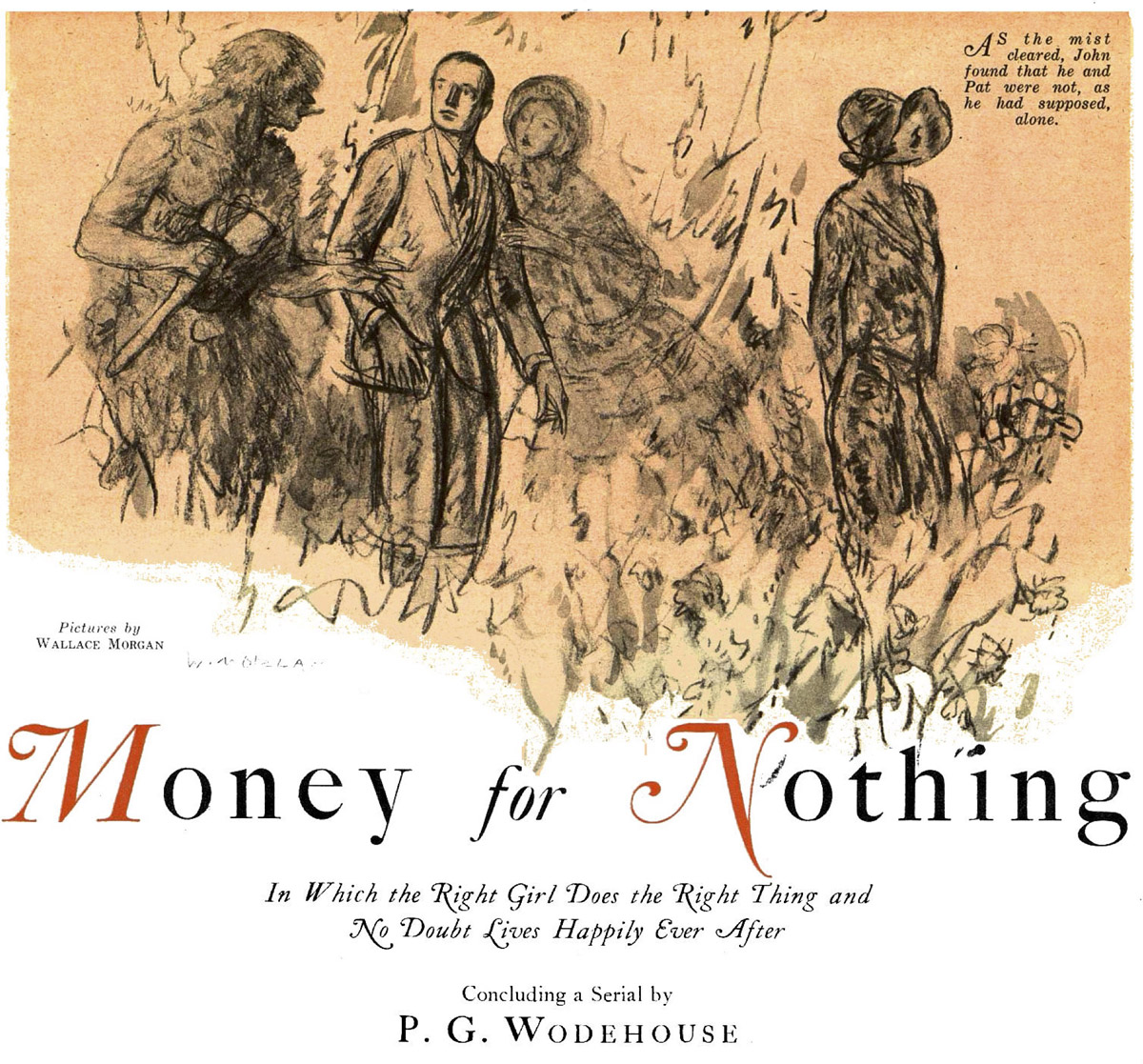
Part Fifteen
SOME years before, in pursuance of his duties as a member of the English Rugby football fifteen, it had become necessary for John one rainy afternoon in Dublin to fall on the ball at a moment when five or six muscular Irish forwards full of Celtic enthusiasm were endeavoring to kick it.
Until this moment he had always ranked that as the most unpleasant and disintegrating experience of his life.
His fingers tightened their clutch on the table. He found its support grateful. He blinked, once very quickly as if he had just received a blow in the face, and then a second time more slowly.
“Pat wants to marry Hugo?” he said.
He felt numbed, just as he had felt numbed in Dublin when what had appeared to be a flock of centipedes with cleated boots had made him the object of their attentions.
All the breath had gone out of him, and though what he was suffering at present was more a dull shock than actual pain, he realized dimly that there would be pain coming shortly in full measure.
“Hugo?” he said.
Faintly blurred by the drumming of the blood in his ears, there came to him the sound of his uncle’s voice. Mr. Carmody was saying that he was delighted. And the utter impossibility of remaining in the same room with a man who could be delighted at the news that Pat was engaged to Hugo swept over John like a wave.
Releasing his grip on the table, he laid a course for the French windows and, reaching them, tottered out into the garden.
Pat was walking on the little lawn, and at the sight of her his numbness left John. He seemed to wake with a start; and, waking, found himself in the grip of a great many emotions, which, after seething and bubbling for a while, crystallized suddenly into a white hot fury.
He was hurt all over and through and through, but he was so angry that only subconsciously was he aware of this. Pat was looking so cool and trim and alluring, so altogether as if it caused her no concern whatever that she had made a fool of a good man—raising his hopes only to let them fall and encouraging him to dream dreams only to shatter them—that he felt he hated her.
She turned as he stepped on to the grass, and they looked at each other in silence for a moment. Then John, in a voice which was strangely unlike his own, said, “Good morning.”
“Good morning,” said Pat, and there was silence again.
She did not attempt to avoid his eye—the least, John felt, that she could have done in the circumstances. She was looking straight at him, and there was something of defiance in her gaze. Her chin was tilted.
To her, judging from her manner, he was not the man whose hopes she had frivolously raised by kissing him that night on the Skirme, but merely an unwelcome intruder interrupting a pleasant reverie.
“So you’re back?” she said.
John swallowed what appeared to be some sort of obstruction halfway down his chest. He was anxious to speak, but afraid that if he spoke he would stammer. And a man on an occasion like this does not wish to give away by stammering the fact that he is not perfectly happy and debonair and altogether without a care in the world.
“I hear you’re engaged to Hugo,” he said, speaking carefully and spacing the syllables so that they did not run into each other as they showed an inclination to do.
“Yes.”
“I congratulate you.”
“You ought to congratulate him, oughtn’t you, and just say to me that you hope I’ll be happy?”
“I HOPE you will be happy,” said John, accepting this maxim from the Book of Etiquette.
“Thanks.”
“Very happy.”
“Thanks.”
There was a pause.
“It’s—a little sudden, isn’t it?”
“Is it?”
“When did Hugo get back?”
“This morning. His letter arrived by the first post, and he came in right on top of it.”
“His letter?”
“Yes. He wrote asking me to marry him.”
“Oh?”
Pat traced an arabesque on the grass with the toe of her shoe.
“It was a beautiful letter.”
“Was it?”
“Very. I didn’t think Hugo was capable of it.”
John remained for a moment without speaking. He searched his mind for carefree, debonair remarks, and found it singularly short of them.
“Hugo’s a splendid chap,” he contrived to say at length—“so bright!”
“Yes.”
“Nice looking fellow.”
“Yes.”
“A thoroughly good chap.”
“Yes.”
John found that he had exhausted the subject of Hugo’s qualities.
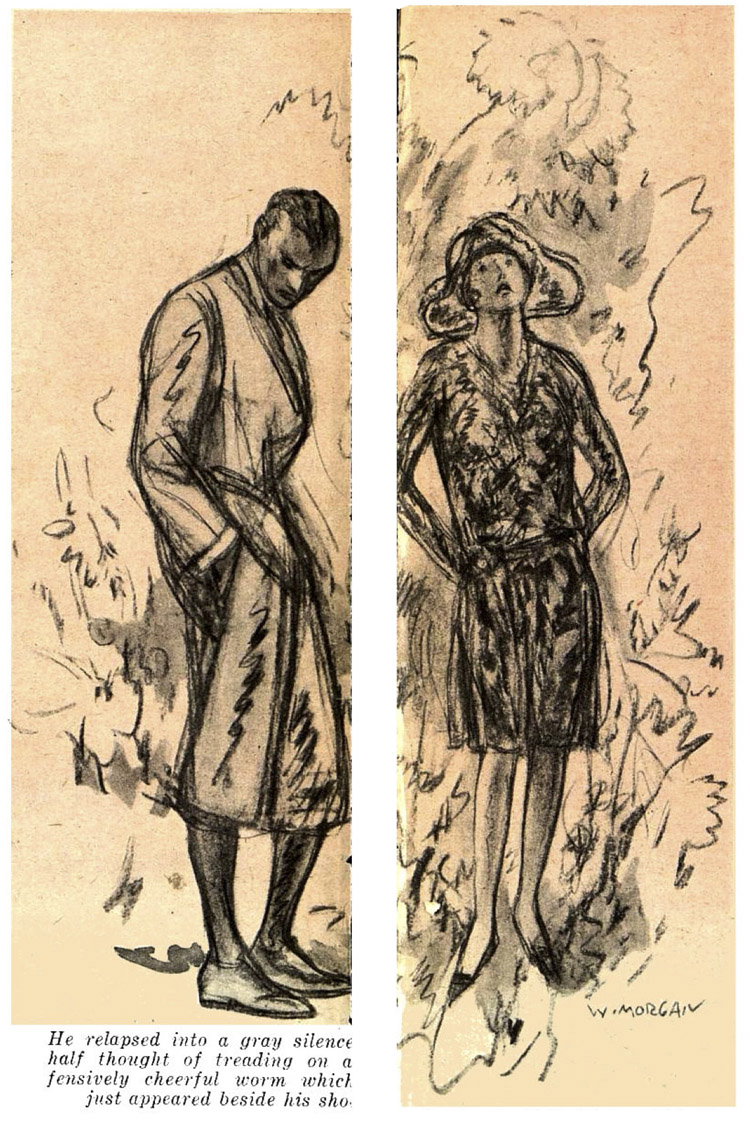
He relapsed into a gray silence, and half thought of treading on an offensively cheerful worm which had just appeared beside his shoe and seemed to be asking for it.
Pat stifled a little yawn.
“Did you have a nice time yesterday?” she asked carelessly.
“Not so very nice,” said John. “I dare say you heard that we had a burglary up at the Hall? I went off to catch the criminals and they caught me.”
“What?”
“I was fool enough to let myself be drugged, and when I woke up I was locked in a room with bars on the windows. I only got out an hour or so ago.”
“Johnny!”
“However, it all ended happily. I’ve got back the stuff that was stolen.”
“But, Johnny! I thought you had gone off picnicking with that Molloy girl.”
“It may have been her idea of picnicking. She was one of the gang. Quite the leading spirit, I gather.”
He had lowered his eyes, wondering once more whether it would not be judicious to put it across that worm after all, when an odd choking sound caused him to look up.
Pat’s mouth had opened, and she was staring at him wide eyed. And if she had ever looked more utterly beautiful and marvelous, John could not remember the occasion. Something seemed to clutch at his throat, and the garden, seen indistinctly through a mist, danced a few steps in a tentative sort of way, as if it were trying out something new that had just come over from America.
AND then, as the mist cleared, John found that he and Pat were not, as he had supposed, alone.
Standing beside him was a rugged and slightly unkempt person clad in a bearskin which had obviously not been made to measure, in whom he recognized at once that stone age ancestor of his who had given him a few words of advice the other night on the path leading to the boathouse.
The ancestor was looking at him reproachfully. In appearance he was rather like Sergeant Major Flannery, and when he spoke it was in that well remembered voice.
“Oo-er,” said the ancestor, peevishly twiddling a flint ax in his powerful fingers. “Now you see, young fellow, what’s happened or occurred or come about, if I may use the expression, through your not doing what I told you. Did I or did I not repeatedly urge and advise you to be’ave towards this girl in the manner which ’as been tested and proved the correct one by me and all the rest of your ancestors in the days when men were men and knew how to go about these matters? Now you’ve lost her, whereas if you’d done as I said—”
“Stay!” said a quiet, saintly voice, and John perceived that another form had ranged itself beside him.
“Still, maybe it’s not too late, even now—”
“No, no,” said the newcomer, and John was now able to see that this was his better self, “I really must protest. Let us, please, be restrained and self effacing. I deprecate these counsels of violence.”
“Tested and proved correct,” inserted the ancestor. “I’m giving him good advice, that’s what I’m doing. I’m pointing out to ’im, as you may say, the proper method.”
“I consider your advice subversive to a degree,” said better self coldly, “and I disapprove of your methods. The obviously correct thing for this young man to do, in the circumstances in which he finds himself, is to accept the situation like a gentleman. This girl is engaged to another man—a good looking, bright young man, the heir to a great estate, and an excellent match—”
“Mashed potatoes!” said the stone age ancestor coarsely. “The ’ole thing ’ere, young fellow, is, you just take this girl and grab her and ’old ’er in your arms, as the saying is, and never mind how many bright, good looking young men she’s engaged to. ’Strewth! When I was in me prime you wouldn’t have found me ’esitating. You do as I say, me lad, and you won’t regret it. Just you spring smartly to attention and grab ’er with both ’ands in a soldierly manner.”
“Oh, Johnny, Johnny, Johnny!” said Pat, and her voice was a wail. Her eyes were bright with dismay, and her hands fluttered in a helpless manner which alone would have been enough to decide a man already swaying toward the methods of the good old days when cave men were cave men.
JOHN hesitated no longer. Hugo be blowed! His better self be blowed! Everything and everybody be blowed except this really excellent old gentleman who, though he might have been better tailored, was so obviously a mine of information on what a young man should know.
Drawing a deep breath and springing smartly to attention, he held out his arms in a soldierly manner, and Pat came into them like a little boat sailing into harbor after a storm.
A faint receding sigh told him that his better self had withdrawn discomfited; but the sigh was drowned by the triumphant approval of the ancestor.
“Oo-er!” boomed the ancestor thunderously.
“So this is how it feels!” said John to himself.
“Oh, Johnny!” said Pat.
The garden had learned that dance now. It was simple, once you got the hang of it. All you had to do, if you were a tree, was to jump up and down; while, if you were a lawn, you just went round and round. So the trees jumped up and down and the lawn went round and round, and John stood still in the middle of it all, admiring it.
“Oh, Johnny!” said Pat. “What on earth shall I do?”
“Go on just like you are now.”
“But about Hugo, I mean.”
Hugo? Hugo? John concentrated his mind. Yes, he recalled now, there had been some little difficulty about Hugo. What was it? Ah, yes.
“Pat,” he said, “I love you. Do you love me?”
“Yes.”
“Then what on earth,” demanded John, “did you go and do a silly thing like getting engaged to Hugo for?”
He spoke a little severely, for in some mysterious fashion all the awe with which this girl had inspired him for so many years had left him. His inferiority complex had gone completely. And it was due, he gathered, purely and solely to the fact that he was holding her in his arms and kissing her.
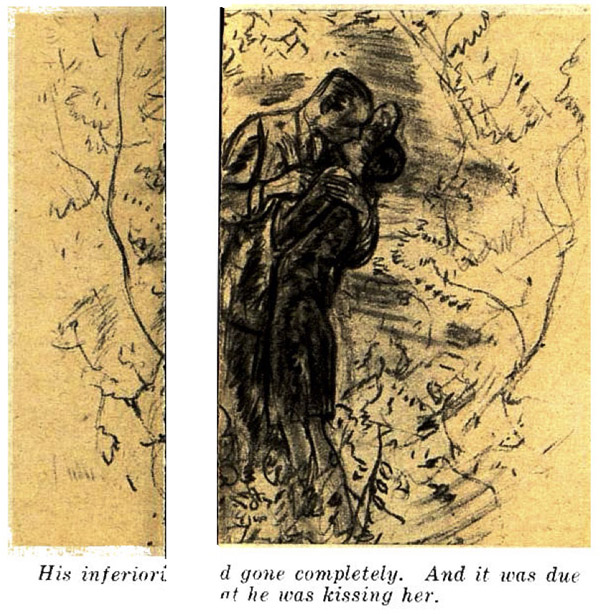
At any moment during the last half dozen years this childishly simple remedy had been at his disposal and he had not availed himself of it. He was astonished at his remissness, and his feeling of gratitude toward that ancestor of his in the baggy bearskin who had pointed out the way became warmer than ever.
“But I thought you didn’t care a bit for me,” wailed Pat.
John stared.
“Who, me?”
“Yes.”
“Didn’t care for you?”
“Yes.”
“You thought I didn’t care for you?”
“Well, you had promised to take me to Wenlock Edge, and you never turned up, and I found you had gone out in your car with that Molloy girl. Naturally I thought—”
“You shouldn’t have.”
“Well, I did. And so, when Hugo’s letter came, it seemed such a wonderful chance of showing you that I didn’t care. And now what am I to do? What can I say to Hugo?”
It was a nuisance for John to have to detach his mind from what really mattered in life to trivialities like this absurd business of Hugo; but he supposed the thing, if only to ease Pat’s mind, would have to be given a little attention.
“Hugo thinks he’s engaged to you?”
“Yes.”
“Well, he isn’t.”
“No.”
“Then that,” said John, seeing the thing absolutely clearly, “is all we’ve got to tell him.”
“You talk as if it were so simple!”
“So it is. What’s hard about it?”
“I wish you had it to do instead of me!”
“But of course I’ll do it,” said John.
It astonished him that she should have contemplated any other course.
Naturally, when the great strong man becomes engaged to the timid, fluttering little girl, he takes over all her worries and handles in his efficient, masculine way any problem that may be vexing her.
“Would you really, Johnny?”
“Certainly.”
“I don’t feel I can look him in the face.”
“You won’t miss much. Where is he?”
“He went off in the direction of the village.”
“Carmody Arms,” diagnosed John. “I’ll go and tell him at once.”
And he strode down the garden with strong, masterful steps.
II
HUGO was not in the Carmody Arms. He was standing on the bridge over the Skirme, his elbows resting on the parapet, his eyes fixed on the flowing water.
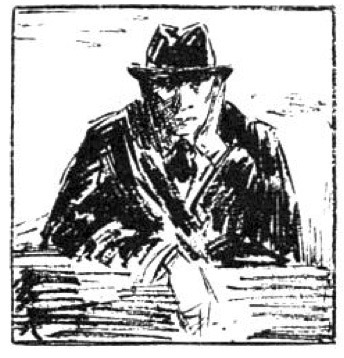 For a suitor recently accepted by—presumably—the girl of his heart, he looked oddly downcast. His eye, when he turned at the sound of his name, was the eye of a fish that has had trouble.
For a suitor recently accepted by—presumably—the girl of his heart, he looked oddly downcast. His eye, when he turned at the sound of his name, was the eye of a fish that has had trouble.
“Hullo, John, old man,” he said in a toneless voice.
John began to feel his way into the subject he had come to discuss.
“Nice day,” he said.
“What is?” said Hugo.
“This.”
“I’m glad you think so. John,” said Hugo, attaching himself somberly to his cousin’s coat sleeve, “I want your advice. In many ways you’re a stodgy sort of a Gawd-help-us, but you’re a level headed kind of old bird, at that, and I want your advice. The fact is, John, believe me or believe me not, I’ve made an ass of myself.”
“How’s that?”
“I’ve gone and got engaged to Pat.”
Having exploded this bombshell, Hugo leaned against the parapet and gazed at his cousin with a certain moody satisfaction.
“Yes?” said John.
“You don’t seem much surprised,” said Hugo, disappointed.
“Oh, I’m astounded,” said John. “How did it happen?”
Hugo, who had released his companion’s coat sleeve, now reached out for it again. The feel of it seemed to inspire him.
“It was that bloke Bessemer’s wedding that started the whole trouble,” he said. “You remember I told you about Ronnie’s man Bessemer?”
“I remember you said he had remarkable ears.”
“Like airplane wings. Nevertheless, in spite of that, he got married yesterday. The wedding took place from Ronnie’s flat.”
“Yes?”
Hugo sighed.
“Well, you know how it is, John, old man. There’s something about a wedding, even the wedding of a gargoyle like Bessemer, that seems to breed sentimentality.
“It may have been the claret cup. I warned Ronnie from the first against the claret cup. A noxious drink. But he said—with a good deal of truth, no doubt—that if I thought he was going to waste champagne on a blighter who was leaving him in the lurch without a tear I was jolly well mistaken.
“So we more or less bathed in claret cup at the subsequent festivities, and it wasn’t more than an hour afterward when something seemed to come over me all in a rush.”
“What?”
“Well, a sort of aching, poignant feeling. All the sorrows of the world seemed to be laid out in front of me in a solid mass.”
“That sounds more like lobster.”
“It may have been lobster,” conceded Hugo; “but I maintain that the claret cup helped. Well, I just sat there, bursting with pity for the whole human race, and then suddenly it all seemed in a flash, as it were, to become concentrated on Pat.”
“You burst with pity for Pat?”
“Yes. You see, an idea suddenly came to me. I thought about you and Pat, and how Pat, in spite of all my arguments, wouldn’t look at you; and all at once there flashed across me what I took to be the explanation. Something seemed to whisper to me that the reason Pat couldn’t see you with a spyglass was that all these years she had been secretly pining for me.”
“What on earth made you think that?”
“Looking back on it now, in a clear and judicial frame of mind, I can see that it was the claret cup. That and the general ghastly, soppy atmosphere of a wedding. I sat straight down, John, old man, and I wrote a letter to Pat, asking her to marry me. I was filled with a sort of divine pity for the poor girl.”
“Why do you call her the poor girl? She wasn’t married to you.”
“AND then I had a moment of sense, so I thought that before I posted the letter I’d go for a stroll and think it over. I left the letter on Ronnie’s desk, and got my hat and took a turn around the Serpentine. And, what with the fresh air and everything, pretty soon I found reason returning to her throne. I had been on the very brink, I realized, of making a most consummate chump of myself.
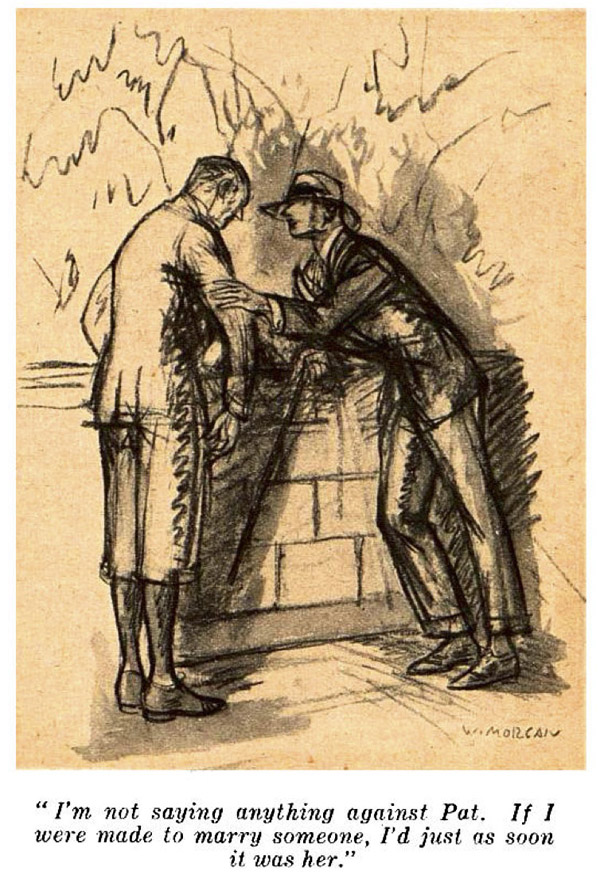 “Here I was, I reflected, on the threshold of a career, when it was vitally necessary that I should avoid all entanglements and concentrate myself wholly on my life work, deliberately going out of my way to get myself hitched up.
“Here I was, I reflected, on the threshold of a career, when it was vitally necessary that I should avoid all entanglements and concentrate myself wholly on my life work, deliberately going out of my way to get myself hitched up.
“I’m not saying anything against Pat. Don’t think that. We’ve always been the best of pals, and if I were backed into a corner and made to marry someone, I’d just as soon it was her. It was the principle of the thing that was all wrong, if you see what I mean. Entanglements. I had to keep myself clear of them.”
Hugo paused and glanced down at the water of the Skirme, as if debating the advisability of throwing himself into it. After a while he resumed.
“I was bunging a bit of wedding cake to the Serpentine ducks when I got this flash of clear vision, and I turned straight round and legged it back to the flat to destroy that letter. And when I got there the letter had gone. And the bride’s mother, a stout old lady with a cast in the left eye, who was still hanging about the kitchen, finishing up the remains of the wedding feast, told me without a tremor in her voice, with her mouth full of lobster mayonnaise, that she had given it to Bessemer to post on his way to the station.”
“So there you were,” said John.
“So there,” agreed Hugo, “I was. The happy pair, I knew, were to spend the honeymoon at Bexhill.
“So I rushed out and grabbed a taxi and offered the man double fare if he would get me to Victoria Station in five minutes. He did it with seconds to spare, but it was too late.
“The first thing I saw on reaching the platform was the Bexhill train pulling out. Bessemer’s face was visible in one of the front coaches. He was leaning out of the window, trying to detach a white satin shoe which some kind friend had tied to the door handle. And I slumped back against a passing porter, knowing that this was the end.”
“What did you do then?”
“I went back to Ronnie’s flat to look up the trains to Rudge. Are you aware, John, that this place has the rottenest train service in England? After the five sixteen, which I’d missed, there isn’t anything till nine twenty. And, what with having all this on my mind and getting a bit of dinner and not keeping a proper eye on the clock, I missed that, too. In the end, I had to take the three A. M. milk train.
“I WON’T attempt to describe to you what a hell of a journey it was, but I got to Rudge at last, and, racing like a hare, rushed to Pat’s house. I had a sort of idea I might intercept the postman and get him to give me my letter back.”
“He wouldn’t have done that.”
“He didn’t have to, as things turned out. Just as I got to the house, he was coming out after delivering the letters. I think I must have gone to sleep then, standing up. At any rate, I came to with a deuce of a start, and I was leaning against Pat’s front gate, and there was Pat looking at me, and I said ‘Hullo!’ and she said ‘Hullo!’ And then she said in rather a rummy sort of voice that she’d got my letter and read it and would be delighted to marry me.”
“And then?”
“Oh, I said, ‘Thanks awfully,’ or words to that effect, and tooled off to the Carmody Arms to get a bite of breakfast. Which I sorely needed, old boy.
“And then I think I fell asleep again, because the next thing I knew was old Judwin, the coffee room waiter, trying to haul my head out of the marmalade. After that I came here and stood on this bridge, thinking things over. And what I want to know from you, John, is what is to be done?”
John reflected.
“It’s an awkward business.”
“Dashed awkward. It’s imperative that I oil out, and yet I don’t want to break the poor girl’s heart.”
“This will require extraordinarily careful handling.”
“Yes.”
John reflected again.
“Let me see,” he said suddenly. “When did you say Pat got engaged to you?”
“It must have been around nine, I suppose.”
“You’re sure?”
“Well, that would be the time the first post would be delivered, wouldn’t it?”
“Yes; but you said you went to sleep after seeing the postman.”
“That’s true. But what does it matter, anyway?”
“It’s most important. Well, look here; it was more than ten minutes ago, wasn’t it?”
“Of course it was.”
John’s face cleared.
“Then that’s all right,” he said. “Because ten minutes ago Pat got engaged to me.”
III
A LIGHT breeze was blowing through the garden as John returned. It played with the sunshine in Pat’s hair as she stood by the lavender hedge.
“Well?” she said eagerly.
“It’s all right,” said John.
“You told him?”
“Yes.”
There was a pause. The bees buzzed among the lavender.
“Was he—?”
“Cut up?”
“Yes.”
“Yes,” said John in a low voice. “But he took it like a sportsman. I left him almost cheerful.”
He would have said more, but at this moment his attention was diverted by a tickling sensation in his right leg. A suspicion that one of the bees, wearying of lavender, was exploring the surface of his calf, came to John. But, even as he raised a hand to swat the intruder, Pat spoke again:
“Johnny.”
“Hullo?”
“Oh, nothing. I was just thinking.”
John’s suspicion grew. It felt like a bee. He believed it was a bee.
“Thinking? What about?”
“You.”
“Me?”
“Yes.”
“What were you thinking about me?”
“Only that you are the most wonderful thing in the world.”
“Pat!”
“You are, you know,” said Pat, examining him gravely. “I don’t know what it is about you, and I can’t imagine why I have been all these years finding it out, but you’re the dearest, sweetest, most angelic—”
“Tell me more,” said John.
He took her in his arms, and time stood still.
“Pat!” whispered John.
He was now positive that it was a bee, and almost as positive that it was merely choosing a suitable spot before stinging him.
But he made no move. The moment was too sacred.
After all, bee stings were good for rheumatism.
THE END
 Madame Eulalie’s Rare Plums
Madame Eulalie’s Rare Plums